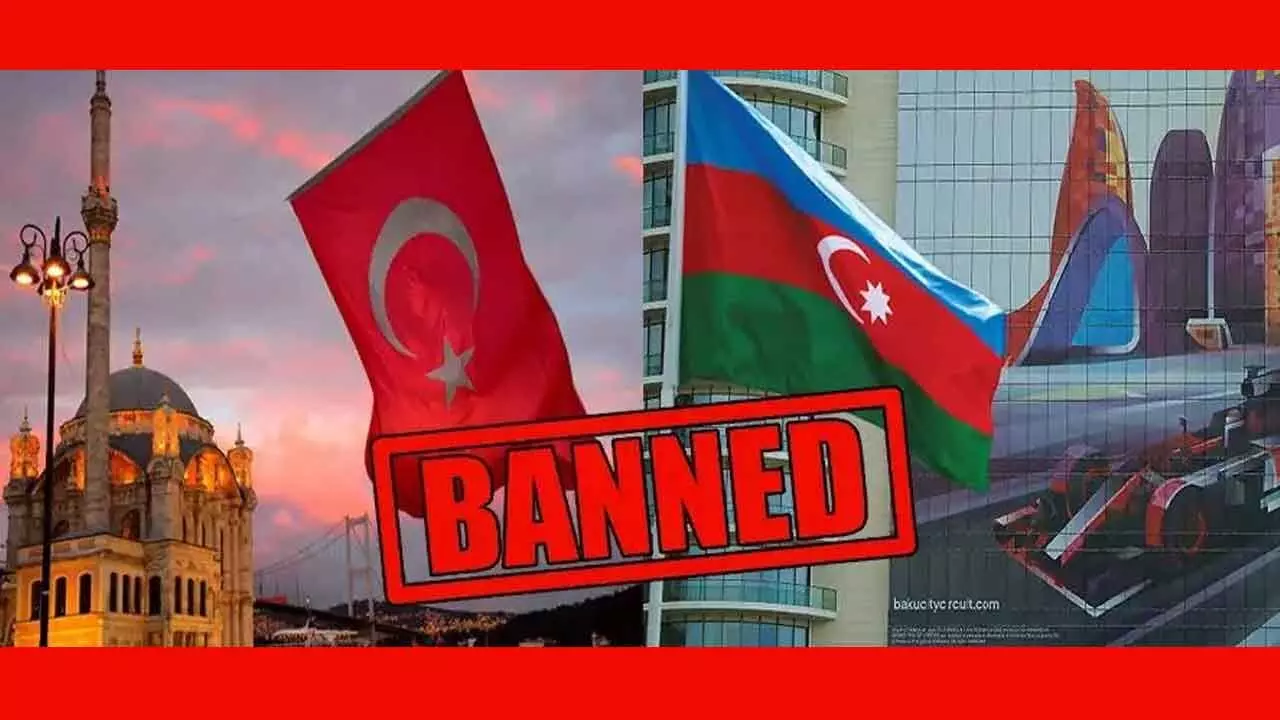Why Turkey, Azerbaijan Are Losing Indian Tourists
The aftermath of Operation Sindoor has exposed Pakistan’s growing diplomatic isolation, with only Turkey and Azerbaijan offering support — a move that sparked calls to boycott them as travel destinations
Why Turkey, Azerbaijan Are Losing Indian Tourists

Turkey and Azerbaijan have expressed solidarity with Pakistan. Erdogan’s ambition to revive a neo-Ottoman empire aligns with Pakistan’s leadership, making Ankara a vocal supporter on issues like Kashmir. Azerbaijan, though not a direct backer of Pakistan, maintains deep ties with Turkey and is often seen as its satellite state
As the tensions between India and Pakistan threaten to boil over into a full-blown India-Pakistan war after Operation Sindoor, the enemy country finds itself increasingly isolated, with even fellow Muslim nations refusing to openly support Islamabad in its escalation against India.
The move to boycott came after official statements from both Turkey and Azerbaijan on April 23, 2025. These were issued following India’s Operation Sindoor, which targeted nine terrorist sites in Pakistan and Pakistan-occupied Kashmir.
Azerbaijan’s foreign ministry said, “The Republic of Azerbaijan expresses its concern over the further escalation of tension between the Republic of India and the Islamic Republic of Pakistan. We condemn military attacks against Pakistan that killed and injured civilians. We stand in solidarity with the people of Pakistan and express condolences to the families of the victims.”
In Islamabad, Turkey’s ambassador to Pakistan met with foreign minister Ishaq Dar. The Pakistani foreign ministry wrote on X that both sides “discussed regional security concerns in depth” and Turkey had termed India’s action as an “unprovoked violation of Pakistan’s sovereignty”.
The response online was immediate. Social media posts widely circulated statistics from 2024, when 2.4 lakh Indians travelled to Azerbaijan and 3.3 lakh visited Turkey. Many posts called for travellers to instead consider Armenia and Greece.
“Tourism is a choice. So is dignity,” read one popular post. Another user, Anant Ladha, wrote on X, “Azerbaijan (Baku) and Turkey should now see India’s power. We should ban these locations from our holidays.”
Following Operation Sindoor, Pakistan has accused India of violating Article 51 of the United Nations Charter. Islamabad had hoped that it would receive support from Muslim countries, but out of the 50+ Islamic nations globally, only Turkey and Azerbaijan have openly stood with Pakistan, while the rest have adopted a moderate stance in the ongoing conflict.
This has come as a shock to the Pakistan, especially its all-powerful military establishment, because Islamabad has long projected itself as the self-proclaimed ‘flag-bearer’ of Islam in South Asia, even though India has a larger Muslim population, in fact, the second-largest in the world.
According to experts, most Muslim countries, barring a few who have vested interests, now see through Pakistan’s duplicity of using religion as facade to operate a terrorist network, and using terrorism as undeclared state policy against India and other neighbouring countries. Additionally, these Muslim nations are not viewing the India-Pakistan conflict through the prism of religion, rather their stance is driven by a diplomatic and economic point of view.
While countries like Saudi Arabia and the United Arab Emirates (UAE) funded heavily funded Pakistan in the recent past, the situation is changing rapidly as both these Gulf giants no longer want to share the platform with Islamabad. Notably, both Saudi Arabia and UAE have moved closer to India, and started distancing themselves from Pakistan in recent times.
The Islamic world has also realised that Pakistan is not willing to resolve the Kashmir issue through bilateral talk, but instead uses terrorism as a means to carry out heinous attacks like Pahalgam, with the Pakistan Army and the country’s civilian government using Kashmir to stay relevant and win popularity at home.
Pakistan’s support for proscribed terror groups like the Lashkar-e-Taiba and the Jaish-e-Mohammed has tainted its image beyond repair, and as such, no sane country is willing to stand with them, barring those who have some sort of vested interest, such as China and Turkey.
In case of Turkey, its President Recep Tayyip Erdogan has long been obsessed with reviving Turkey’s ancient glory by building a modern version of the Ottoman Empire, and ruling the Islamic world. Erdogan’s narrative has found support among Pakistan top military and civilian leadership, hence Ankara is openly standing with Islamabad in the conflict with New Delhi, and often brings up the Kashmir issue, which it has no stake or business in.
Azerbaijan’s case is a bit different. While not a direct supporter of Pakistan, Azerbaijan shares close diplomatic, economic, defense and cultural ties with Turkey, to the extent that some experts have even called it a satellite state of Ankara. Azerbaijan’s relations with Pakistan essentially started developing during the former’s 2020 war against Armenia, during which Islamabad openly supported Baku, and even offered military support.
“Due to Turkey’s non-cooperative stance in the current global scenario involving India and Pakistan, we’ve decided not to offer any accommodation services to Turkish citizens in Goa. We stand firmly with our nation,” the company wrote on X. Atlys, a visa processing firm, and global travel app Skyscanner had earlier reported that Azerbaijan had become a popular option for Indian travellers in summer 2025 before the current events unfolded.

